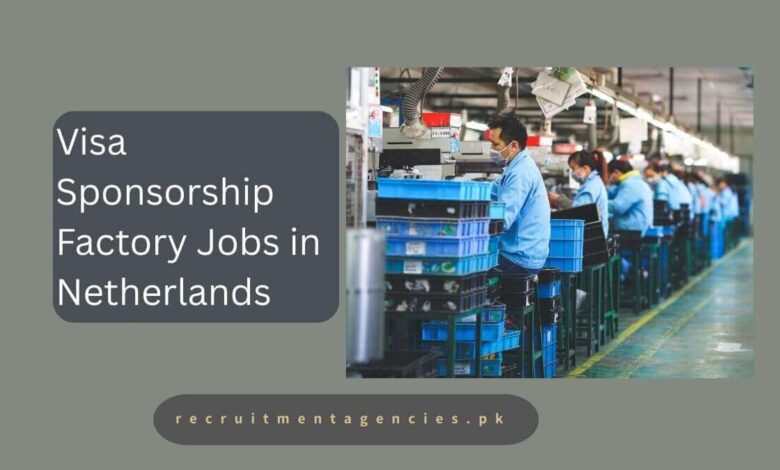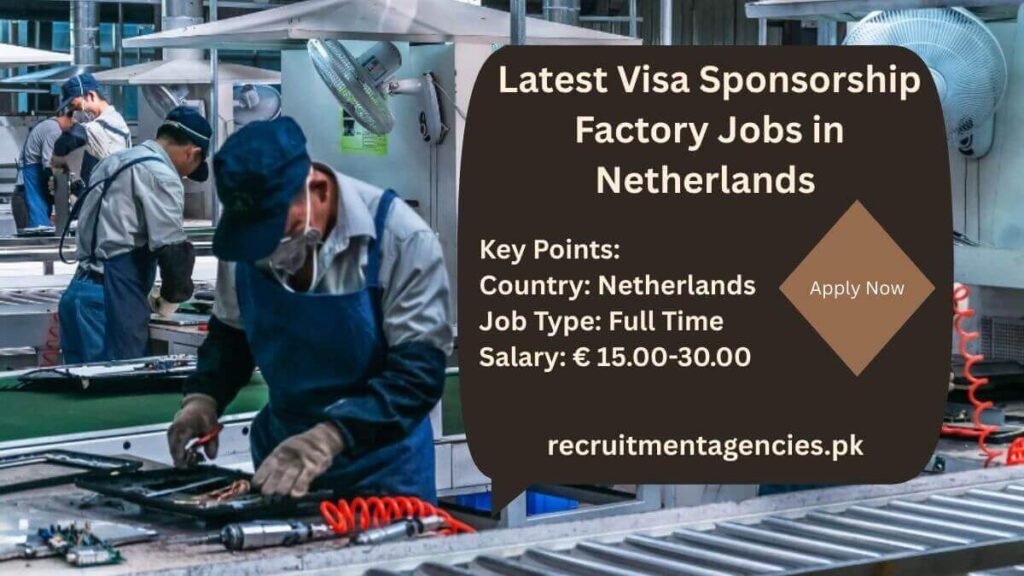Visa Sponsorship Factory Jobs in Netherlands 2025 | €32,173 Per Year

Visa-sponsored factory positions in the Netherlands for 2025 present attractive opportunities for international candidates seeking employment in the country’s robust manufacturing sector. These roles offer competitive salaries, comprehensive benefits, and a pathway to work and live in the Netherlands.
Check Also: Jobs in Netherlands with Visa Sponsorship for Foreigners

Job Details:
| Country | Netherland |
| Job | Factory Jobs |
| Education | High School Diploma |
| Experience | 2-3 Years |
| Age | 19-45 |
| Who can Apply? | All Nationalities |
| Salary | €32,173 a year |
| Visa Sponsorship | Yes |
Requirements:
- Capable of engaging in physical labor and employing instruments as required
- Employment Offer: It is mandatory for a Dutch employer to extend an offer of employment that includes the cost of your visa. The provisions of this offer encompass all aspects of the position, including your compensation, benefits, and responsibilities.
- Work Permit or Visa: The necessity of a work permit or visa to begin employment in the Netherlands may differ based on the individual’s nationality and intended duration of stay. Any necessary documentation, such as a work visa or residency permit, will be managed by your manager.
- Skills and Experience: Although specific organizations may have unique formal education requirements, distribution center personnel who possess essential skills and abilities are frequently in high demand. Such qualifications may necessitate prior experience in development work, knowledge of inventory management frameworks, and proficiency with equipment or instruments.
- Language Proficiency: The position’s nature and the boss’s requirements may necessitate proficiency in Dutch and English. Basic competencies encompass effective collaboration with both superiors and peers, comprehension of mandates, adherence to security conventions, and verbal communication.
- Health Protections: The Netherlands consistently mandates that foreign laborers comply with health protection regulations. Your supervisor may provide health insurance or assist you in obtaining it to facilitate your access to therapeutic care during your stay.
- Financial Resources: When applying for a visa, it is necessary to demonstrate that you have the necessary funds to sustain yourself for the initial months of your stay in the Netherlands, although it is not a standard requirement.
Responsibilities:
A worker’s obligations and duties on the production line regularly incorporate the following:
- at a generation location
- Inspecting and monitoring apparatus
- Maintaining compliance with security and well-being protocols at all times
- Assembling components or objects
- Preparing objects or components for shipment or advance processing
- Operating platform jacks and forklifts as necessary
- Sorting and evaluating products to ensure quality
- Eliminating defective products and rejects
Benefits:
- Employment Opportunities:
The Dutch economy is dynamic and unique, offering a wide range of business opportunities in various sectors, such as agriculture, retail, construction, and logistics. These distinctions enable individuals who require formal education or specialized abilities to obtain employment. - Competitive Compensation:
The Netherlands generally increases the minimum pay in comparison to other countries. Competitive compensation is available for positions that are considered modest, and it can guarantee a sufficient standard of living. - Worker Security:
The Netherlands has robust labor laws that safeguard the rights of its workers. Working hours, relaxation periods, and end conditions are regulated to guarantee that the working environment is treated decently. - Social Security Benefits:
The Netherlands provides a diverse array of social security benefits to its personnel, including those in low-level positions. These include annuity schemes, unemployment benefits, and well-being protections, which offer financial stability and support during periods of illness, unemployment, or retirement. - Work-Life Balance:
The Dutch work culture places a high value on the preservation of a healthy work-life balance. Managers are generally in favor of part-time work and flexible working hours, which enable employees to effectively manage their personal and professional lives. - Access to Public
Services: In the Netherlands, employees have the opportunity to utilize top-tier public services, including healthcare and education. Open instruction is either free or reasonably priced, and the healthcare framework of the country is renowned for its quality and transparency. - Safe Working Conditions:
The Netherlands has comprehensive policies regarding occupational health and safety. Bosses are dedicated to ensuring that the necessary equipment and supplies are provided and that secure working conditions are maintained to prevent workplace accidents and injuries. - Integration and Bolster Programs:
The Netherlands provides a diverse array of integration programs for remote laborers, including dialect courses and social introduction sessions. These activities foster the assimilation of migrants into Dutch society and enhance their employment opportunities. - Prospects for Advancement:
Even modest positions offer opportunities for preparation and skill development. Numerous supervisors offer on-the-job training and encourage employees to pursue additional education and professional development, which can lead to occupational advancement.
Salary:
Within the Netherlands, the average annual salary for a Plant Laborer is €32,173 and the hourly rate is €15. The anticipated compensation for a production line laborer is €24,419 to €37,449. The most significant level of education for a factory worker is typically a high school diploma.
How to Apply?
- Managers from the Netherlands use online job platforms to advertise employment opportunities, including sponsorship-eligible positions. We will use these worksheets to find positions that match your qualifications and experience, allowing you to tailor your application to the manager. In the Netherlands, LinkedIn, Without a Doubt, and Workopolis are among the most prominent job forums.
- In the Netherlands, there are numerous business departments that specialize in the situation of remote laborers in visa-sponsoring positions. These offices will assist you in identifying business opportunities that align with your qualifications and experience if you surrender your ongoing work inclinations.
- You may apply for high-paying menial employment with visa sponsorship in the Netherlands as a remote national by selecting the “Apply Now” interface shown below.
- The landing page will present you with a selection of vacant positions. In order to arrange application prerequisites and strategies, you will need to reach the initial position at a later time.
Frequently Asked Questions:
Are there temporary or seasonal factory jobs?
Yes, many factory jobs in the Netherlands are temporary or seasonal, particularly in industries like food production or logistics. These positions are often filled through temporary staffing agencies.
Do I need experience to get a factory job?
Experience may not be necessary for entry-level jobs, as many factories provide training. However, for more specialized roles, such as machine operators or maintenance workers, previous experience or specific skills may be required.
Do I need to speak Dutch to work in a factory in the Netherlands?
It depends on the employer and the specific job. Many international companies in the Netherlands offer factory jobs where English is the working language, especially in larger cities or specialized sectors. However, speaking Dutch can be an advantage for communication and integration.



